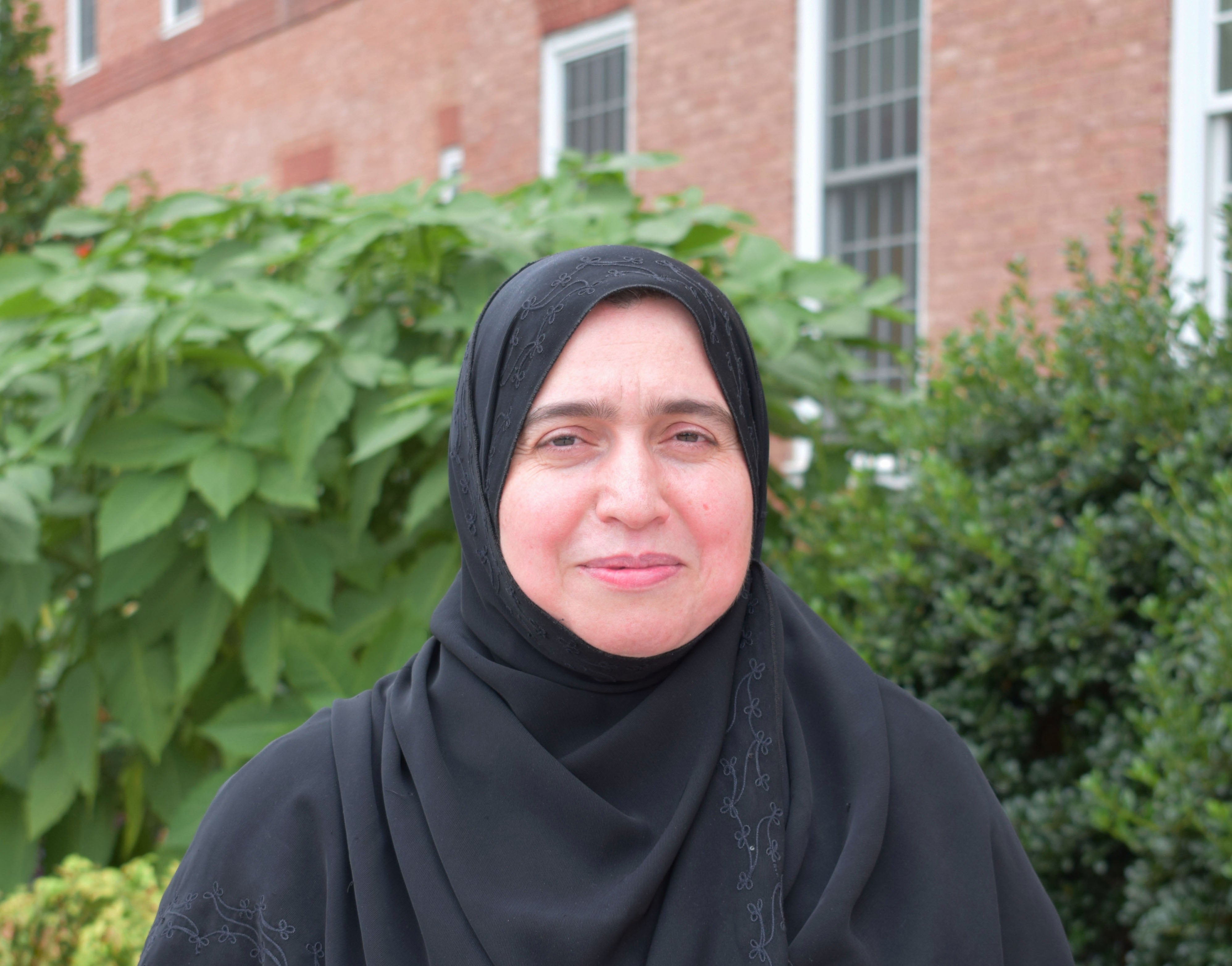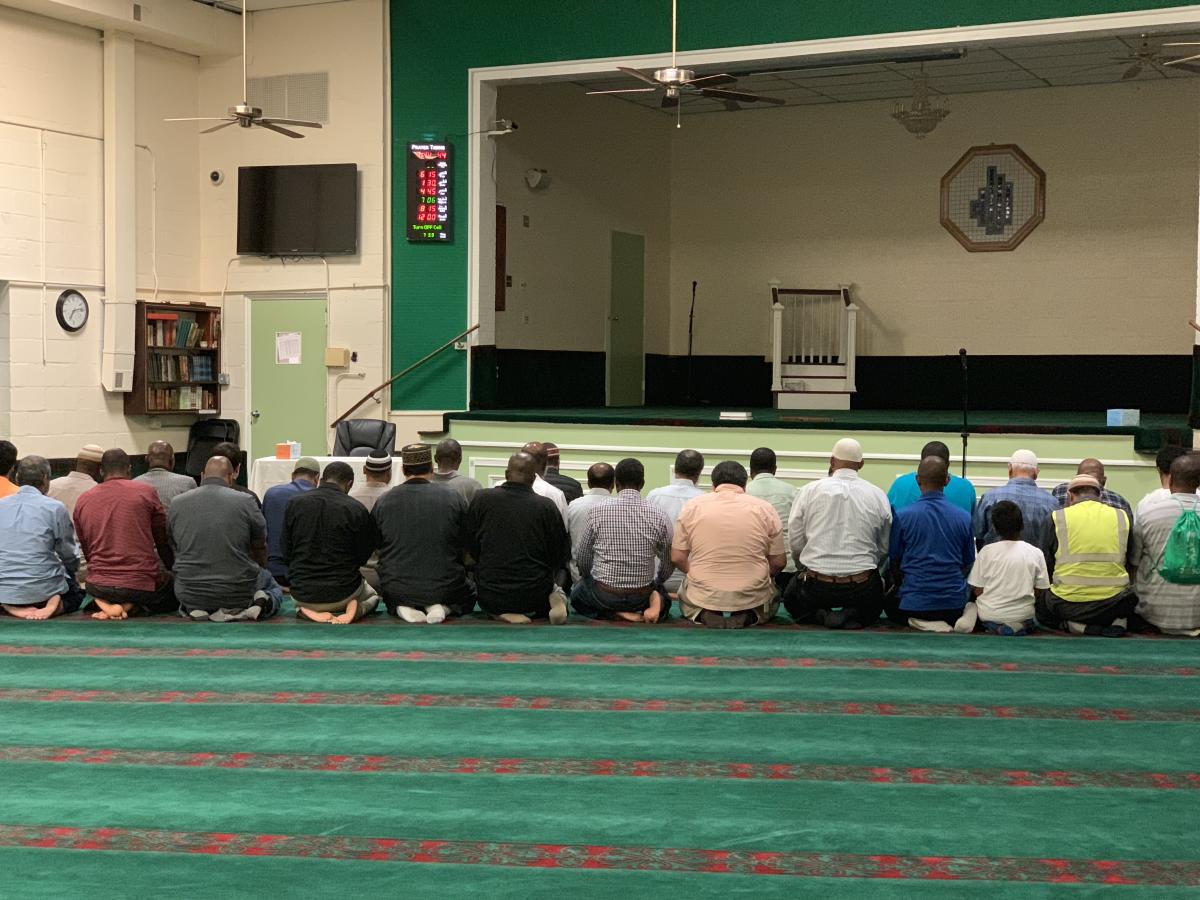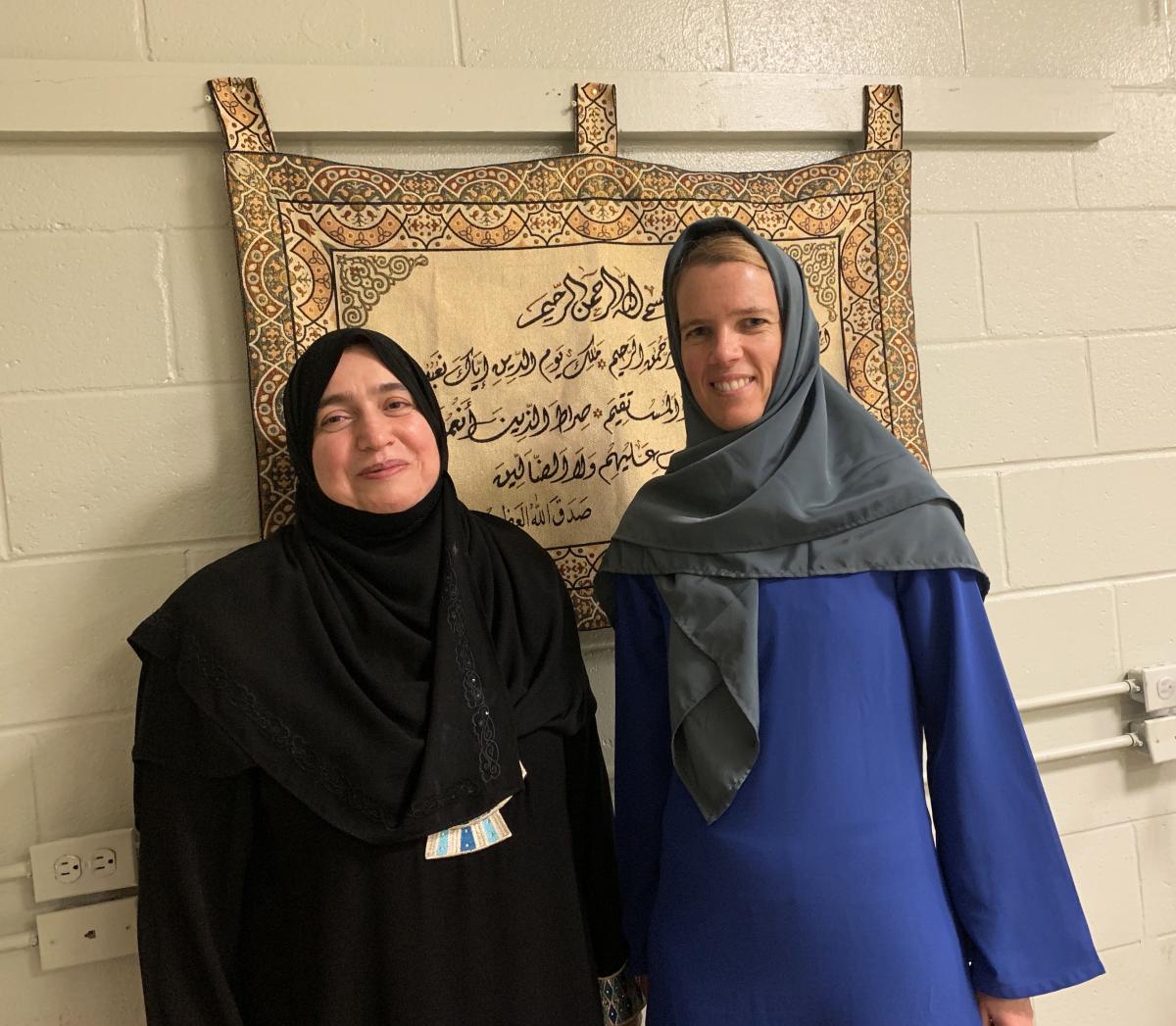 By Anna De Cheke Qualls
By Anna De Cheke Qualls
1989 might ring a bell. It was the year that the Berlin Wall came down, the Dalai Lama won the Nobel Peace Prize, students demonstrated at China’s Tiananmen Square, and Romanian dictator Nicolae Ceausescu was deposed and executed. It was also the year that an 18-year-old Syrian woman, named Nabila Hijazi, first stepped foot on American soil.
Just out of high school and recently married, Hijazi was joining her husband in Maryland to start a new life. One of 13 siblings, she grew up in the largely Sunni Muslim town of Al-Tall, about 12 miles outside Damascus. With an average elevation of 6,500 feet, the surrounding Al-jabal Ash-sharqī Mountain Range to this day serves as a natural border to Lebanon--ending in the South with Syria’s highest point, 9,232-foot Mount Hermon.
When Hijazi was growing up, Al-Tall was considered suburban. And while education was important, few women of her generation continued their academic studies beyond high school. From an early age, Hijazi had a hunger for learning, languages and writing. But, as women in comparable cultural circumstances, Hijazi was expected to take her place as an adept homemaker and mother.
The tumultuous 1980’s in Syria also shaped Hijazi’s values -– her Muslim faith, the importance of family and education. And, as for any immigrant, these beliefs and priorities provided her with safety in a commonly difficult transition to a new place. “Due to cultural reasons, I started wearing the hijab when I was six years old. However, as I grew up and did some research and learned about Islam on my own, I became more invested in veiling. For me, the hijab was always a personal choice. In high school, I became more interested in the Islamic faith, and after studying it, I felt reaffirmed in my beliefs. For me, faith has always been about liberation. If you think about why we live on Earth, there has to be a reason for it beyond personal gain -– to answer to and understand the divine, Allah. He created us not just to do something good for humanity, but also to worship Him. And, part of worship is being grateful for what we have been given, and making the most of every blessing, including our family, community and education,” says Hijazi, a doctoral student in the English Department.
While Hijazi’s husband studied and worked part-time, Hijazi started taking business classes at Prince George’s Community College (PGCC) in 1990. After her first child eight years later, she interrupted her education and focused on family. A few years after that, twins came along. For seven years, Hijazi invested in her children and the community around her -– which included a handful of families living in co-housing.
“It was four families in the same house, because we do not believe in mortgages, for religious reasons. We cooked together, ate together, prayed together and practiced Arabic. We had no privacy, but we had constant support among the adults. The children had this big family. I am not going to say it was easy. It was really tough. But, I wouldn’t have done it any other way,” recalls Hijazi.
When her children entered preschool in 2003, Hijazi returned to PGCC part-time to finish her associate’s degree. In between raising children and tending to the home, she made time to graduate magna cum laude, which she repeated for her bachelor’s degree in accounting with a minor in English from the University of Maryland (UMD) in 2005. A year later, Hijazi started her UMD master’s degree in English Language and Literature, with a concentration in Composition and Rhetoric. She also taught for the department. Three years later, she earned her master’s with the intention of continuing to teach college-level courses and improving her Arabic translation competency. In 2014, she entered the PhD program.
“I am the first female in my family, among my generation, to graduate with a bachelor's. I will also be the first female to have a PhD among all generations in my family. My oldest brother and two male cousins have PhDs. Basically, many of my female family members look to me as someone who balances the different roles I embody: wife, mother, student, educator and community contributor,” remarks Hijazi.
And with three children, a household full of responsibilities, and community work, one wonders how Hijazi finds proportion. With her faith as the foundation, she navigates each day with incredible discipline and energy. Hijazi’s day starts at 4 A.M. She prays, makes coffee, then focuses on her academic work for an hour or two. Depending on the time of year, the family prays Fajr, the first of the five daily Islamic prayers, together at 5:30. Afterwards, Hijazi continues either housework, dinner preparation or doctoral work. She makes everybody’s sandwiches for the day. By 7:30 or 8:00 A.M., her children and husband are off to work or school, and she either works in the home or goes to campus. If she’s at home, she cleans, does laundry or visits her elderly mother nearby. On campus, she works part-time while completing her own research. At 4:00 P.M., Hijazi’s younger children return, followed by her daughter and husband in the early evening.
It is a priority that the Hijazi family eat and converse together. The children, including her twin teenage sons, help clean the kitchen. Everyone then sits down for tea and added family time. Hijazi is in bed by 10:00 or 10:30. “With my children, I keep tying housework to Islam and the Prophet [Salaah Salem]. He was the best example in His household. He would sew His own clothes, and serve dinner. Some claim that men don’t do that. That’s culture, not Islam. With my children being my life, I want them to be successful, and I do everything I can to ensure their progress and success, even if that means I come second. So, as long as my children are doing well in all areas of their lives, I don’t see why I can’t do the same, set an example, and be productive on so many different levels, but most importantly, honoring Allah,” says Hijazi.
“When I say these things, I have to be careful because people may misunderstand the Muslim faith and mix it with culture. When people see my hijab, some think I among Muslim women, am submissive to others, especially males. But, to be clear, Islam is all about submission to the will of Allah, the creator who commands us to be kind, intellectual and educated. If you are Muslim, it is natural that you follow some basic principles; nonetheless, there is negotiation, intellectual discourse and collaboration between husband and wife. There is an understanding of what each should do, knowing it is not mutually exclusive,” observes Hijazi. “You can be forward-thinking and look like this [pointing to her hijab and abaya]. Progressiveness doesn’t come from your outward appearance but from the development of your mind and spirit,” she adds.
This is why Hijazi is drawn to the spiritual community at her Masjid (Prince George’s Muslim Association) and the academic community at UMD.  In both places, she finds nourishment as a recipient and provider of what each has to offer. She has a tremendous background and passion for teaching others, both on an academic and community-based basis. In turn, she benefits from the intellectual discourse at Maryland and the women’s network at PGMA. “As women, we have to know what is going on. We know education is power. We are encouraged to go for both spiritual and academic knowledge, so we can contribute to society. This is why you have sister Nabila working on her PhD. Also, raising and teaching good, God-fearing children is a community effort, largely done by women. Where I come from we say ‘it takes a village to raise a child,’ and that’s how we operate – we raise each other’s children. We teach them how to lead a peaceful life and how to interact with people, and be good citizens,” observes Sister Ayo Dindi of PGMA. “Education is the key, and there is no limit on how far we can go. As any parent, we need training to support, and help our children in the best way possible. Anyone talking about our outward appearance or home life detracts the conversation from what is really important for us,” adds Sister Hafsah Iro.
In both places, she finds nourishment as a recipient and provider of what each has to offer. She has a tremendous background and passion for teaching others, both on an academic and community-based basis. In turn, she benefits from the intellectual discourse at Maryland and the women’s network at PGMA. “As women, we have to know what is going on. We know education is power. We are encouraged to go for both spiritual and academic knowledge, so we can contribute to society. This is why you have sister Nabila working on her PhD. Also, raising and teaching good, God-fearing children is a community effort, largely done by women. Where I come from we say ‘it takes a village to raise a child,’ and that’s how we operate – we raise each other’s children. We teach them how to lead a peaceful life and how to interact with people, and be good citizens,” observes Sister Ayo Dindi of PGMA. “Education is the key, and there is no limit on how far we can go. As any parent, we need training to support, and help our children in the best way possible. Anyone talking about our outward appearance or home life detracts the conversation from what is really important for us,” adds Sister Hafsah Iro.
“Camaraderie is very important in all aspects of life for both men and women, but especially when it comes to faith. Like men, women need the sisterhood and the support networks to encourage worship, and to help one another, whatever the need may be. We have a committee that really focuses on the issues of women and community work -– such as the Girl Scouts program, which happens to be the second largest troop in the area,” says Brother Jameel Aalim-Johnson, a member of PGMA’s Executive Council.
 In 2017, Hijazi was in the process of writing her dissertation proposal. While doing so, she got involved with another project at PGMA, this time focused on Syrian refugees. Hijazi contributed her extensive experience teaching writing to multilingual students by coordinating English classes for Syrians and Iraqis living in Riverdale and Landover.
In 2017, Hijazi was in the process of writing her dissertation proposal. While doing so, she got involved with another project at PGMA, this time focused on Syrian refugees. Hijazi contributed her extensive experience teaching writing to multilingual students by coordinating English classes for Syrians and Iraqis living in Riverdale and Landover.
And even though PGMA would provide free transportation and child care to students, very few actually came. After a while, the program focused solely on women. And Hijazi, given her background, got curious. “I kept wondering why throughout the course, enrollment was so low. Beyond some of the technical or logistical issues of the program, it was apparent there were other reasons for low enrollment and retention, and this became the focus of my dissertation. I decided to interview these women to understand how language programs can be created to attract/retain students. I know cultural perspectives have something to do with it -- education may not be a woman’s first priority. Children come first. And many of the Syrian women refugees, especially from rural areas, have a limited education. But to succeed in this country, women need education,” says Hijazi.
And there was another reason for this line of research. “Part of my faith is being helpful to others in need, and empowering women -– and through women, their children. If you become educated in this country, you can better understand the culture and the language. If parents do not keep up with their children, there will be a divide -– and a loss of religious identity that they had when they came here. To be successful, the main person in the family is the mother -– she is key. If you have educated mothers who can be with their children, work with them and be on the same level as them, we can have productive and successful families in this country. That’s why women are the kernel of each family and they can make a difference by transforming their own lives. In this regard, my work ties back to my faith and taking care of those in need, building community, empowering and educating women, and giving them access to education and eventually success,” observes Hijazi.
Given the rigor of part-time doctoral work coupled with three children and a household, doing work that is an extension of who you are certainly helps with motivation and focus. Not too long ago, institutions would have labeled Hijazi as a ‘non-traditional’ graduate student. In fact, more and more students these days in graduate school work and have families. In turn, institutions have started to offer better support systems and professional development to help manage competing priorities, while graduate programs have learned to provide accommodations.
“While many graduate students can boast of being a great student and a great teacher, very few of them can do so and also add the impressive outreach work that Nabila has regularly undertaken. She has worked with multilingual students in many different capacities. Nabila is ideally positioned to do this work, as she draws on her own experiences as an immigrant to this country in order to offer others in similar circumstances the cultural and linguistic knowledge that will help them become comfortable in their new home and succeed. We are thrilled to support her work both within and without the university,” remarks Dr. Kellie Robertson, Director of Graduate Studies in the English Department.
And while the doctoral path isn’t quite over for Hijazi, she’s not worried. She has the holistic support that doctoral students need in order to ensure completion. “I keep coming back to my experience. Even though it took me longer to accomplish and be where I am, I am proud of what I have done. I am also proud of my family, especially children. Having this academic experience has sharpened my mind, and I value being a part of an intellectual community. It makes me a better mother, and a better person,” concludes Hijazi.
More information about Nabila Hijazi can be found here.
(Photo Credits: Anna De Cheke Qualls)
